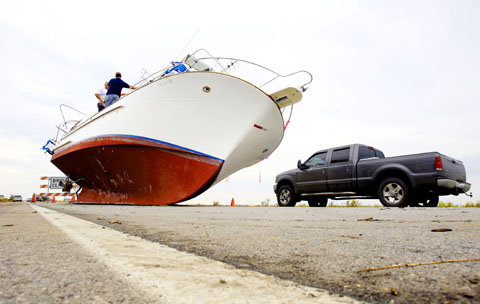Tropical Storm Hanna closed in on the southeastern US coast yesterday after leaving 136 dead in Haiti as a powerful hurricane swept across the Atlantic, posing a potential threat to Caribbean islands and the US.
Hanna pushed through the Bahamas on its way to the US Atlantic coast, prompting emergency preparations before its expected arrival late yesterday after causing flooding and landslides in Haiti that left thousands homeless.
The Miami-based National Hurricane Center (NHC) warned that Hanna could strengthen and gain hurricane status yesterday before reaching the US near North or South Carolina at the weekend.

PHOTO: AP
Hanna “has been an erratic storm. It’s already done a lot of flooding [and] we are expecting it to strengthen slightly” before yesterday, NHC forecaster John Cangialosi said.
Heavy rain, wind and high surf were forecast along the southeastern coastline ahead of the storm’s arrival as governors in North Carolina and Virginia declared states of emergency, while South Carolina Governor Mark Sanford called for voluntary evacuations in two counties threatened by the storm.
At 0600 GMT yesterday, the center of the storm was 90km north of Great Abaco Island in the Bahamas and about 790km south of Wilmington, North Carolina, the center said.
The storm was moving toward the northwest at about 30kph and was expected to pick up speed as it clears the Bahamas and heads northwest to the US coast.
“The center of Hanna will be near the southeast coast of the United States later today,” it said.
Hanna packed sustained winds of near 100kph, with higher gusts, according to reports from a reconnaissance aircraft.
A hurricane watch remained in effect for parts of the North and South Carolina coast as authorities prepared for possible flooding and kept a wary eye on a more formidable storm out in the Atlantic.
While Hurricane Ike was downgraded to a category three storm on the five-level Saffir-Simpson scale, it remained a threat to the US as it moved over the western Atlantic, the center said.
With maximum sustained winds of near 215kph, it was “still forecast to be a major hurricane in a couple of days,” it said.
A third system, Tropical Storm Josephine, was reported in the eastern Atlantic some 1,010km west of the southernmost islands of Cape Verde, moving in a west-northwest direction at about 17kph.
The storm, which disrupted shipping in the area but was not close to land, had maximum sustained winds of 75kph, with higher gusts.
The storms follow Hurricane Gustav, which ripped through the Caribbean then slammed the US Gulf Coast, and Tropical Storm Fay, which also pounded several Caribbean islands and made landfall in Florida four times, dumping record amounts of rain.
Haiti’s third-largest city, Gonaives, remained under water in the wake of Hanna on Thursday.
Alta Jean-Baptiste, head of Haiti’s civil protection office, said that flooding and landslides triggered by the heavy rain forced nearly 10,000 people into shelters — not including thousands more who had evacuated Gonaives, a city of 300,000.
Haitian Senator Yuri Latortue, who represents the city, called the situation “catastrophic,” saying some 200,000 people there had not eaten for three days.
Hanna struck Haiti one week after it was hit by Hurricane Gustav, which killed 77 people.

READINESS: According to a survey of 2,000 people, 86 percent of Swedes believe the country is worth defending in the event of a military attack Swedes are stocking up on food items in case of war, as more conflict in Europe no longer feels like a distant possibility, and authorities encourage measures to boost readiness. At a civil preparedness fair in southwest Stockholm, 71-year-old Sirkka Petrykowska said that she is taking the prospect of hostilities seriously and preparing as much as she can. “I have bought a camping stove. I have taken a course on preservation in an old-fashioned way, where you can preserve vegetables, meat and fruit that lasts for 30 years without a refrigerator,” Petrykowska said. “I’ve set aside blankets for warmth, I

FRUSTRATIONS: One in seven youths in China and Indonesia are unemployed, and many in the region are stuck in low-productivity jobs, the World Bank said Young people across Asia are struggling to find good jobs, with many stuck in low-productivity work that the World Bank said could strain social stability as frustrations fuel a global wave of youth-led protests. The bank highlighted a persistent gap between younger and more experienced workers across several Asian economies in a regional economic update released yesterday, noting that one in seven young people in China and Indonesia are unemployed. The share of people now vulnerable to falling into poverty is now larger than the middle class in most countries, it said. “The employment rate is generally high, but the young struggle to

ENERGY SHIFT: A report by Ember suggests it is possible for the world to wean off polluting sources of power, such as coal and gas, even as demand for electricity surges Worldwide solar and wind power generation has outpaced electricity demand this year, and for the first time on record, renewable energies combined generated more power than coal, a new analysis said. Global solar generation grew by a record 31 percent in the first half of the year, while wind generation grew 7.7 percent, according to the report by the energy think tank Ember, which was released after midnight yesterday. Solar and wind generation combined grew by more than 400 terawatt hours, which was more than the increase in overall global demand during the same period, it said. The findings suggest it is

‘ARMED CONFLICT’: At least 21 people have died in such US attacks, while experts say the summary killings are illegal even if they target confirmed narcotics traffickers US forces on Friday carried out a strike on an alleged drug-smuggling boat off the coast of Venezuela, killing four people, US Secretary of Defense Pete Hegseth said. The latest strike, which Hegseth announced in a post on X, brings the number of such US attacks to at least four, leaving at least 21 people dead. An accompanying video shared by Hegseth showed a boat speeding across the waves before being engulfed in smoke and flames. “Four male narco-terrorists aboard the vessel were killed,” the Pentagon chief wrote. He said the strike “was conducted in international waters just off the